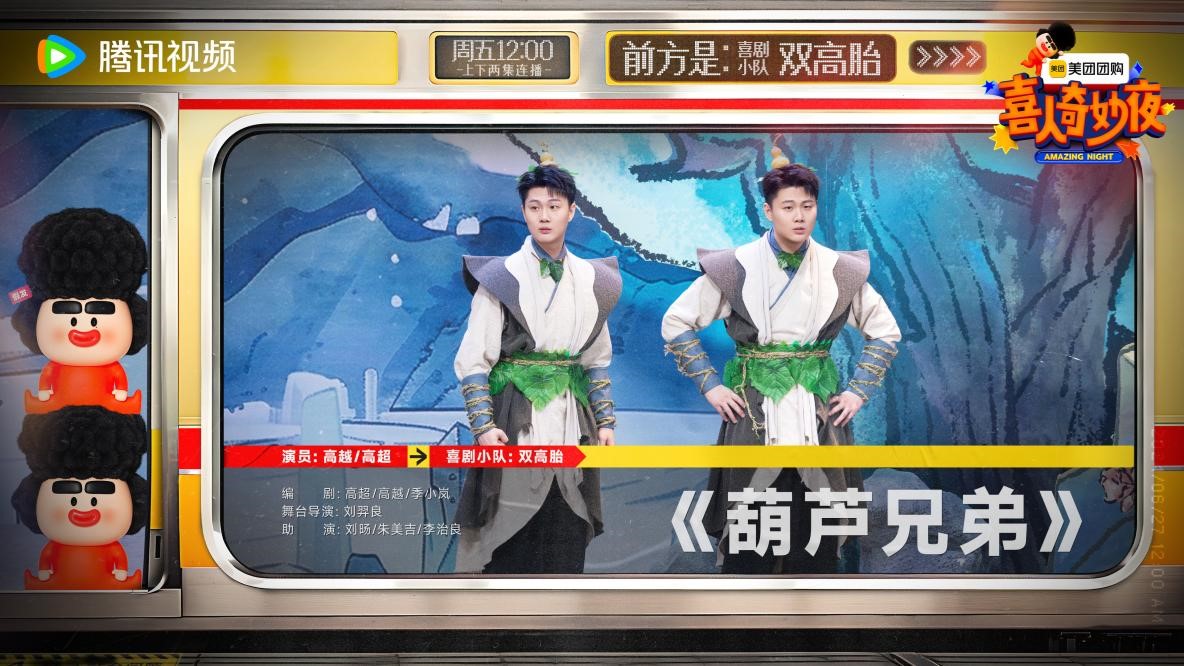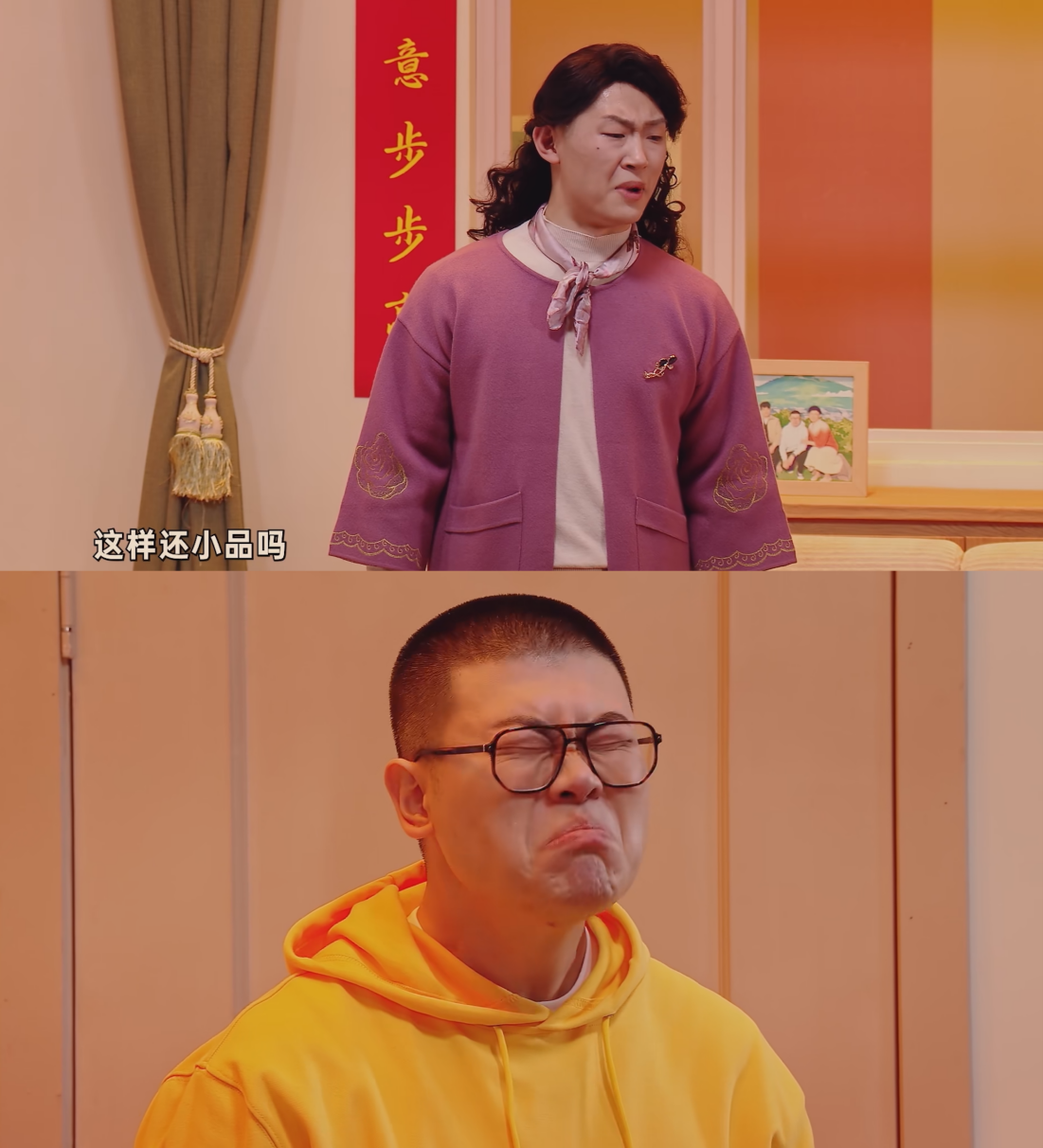
The broadcasting platform was changed from iQiyi to Tencent Video, and the name was changed from the original "Annual Comedy Competition" to "A Wonderful Night of Joy". For Miwei's heavyweight comedy variety show, it is also a new start. After all, the "Annual Comedy Competition 2" two years ago has attracted a lot of criticism, and its reputation, popularity and influence are weaker than the first season.
Judging from the top 15 from the 20 in the first stage, "A Wonderful Night" has gained a good reputation overall. It continues the genes of the "Annual Comedy Competition" and focuses on "sketch comedy", that is, sketch. It uses the advantages of sketch comedy such as lightness, brightness, flexibility and innovation to break down an old wall and "deconstruct" the various frameworks and constraints of traditional comedy represented by sketches, bringing laughter to the audience.

After two episodes, "A Wonderful Night" is quite popular
However, the program mentioned that Miwei is a "comedy hell" and everyone who participated in the program was very painful. The pain comes from the program unconsciously turning sketch comedy into a skit: pursuing a complete beginning, development, turning point, and ending, with a good ending, a happy beginning and a sad ending... When comedy creators constantly polish a sketch comedy in the state of creating a Spring Festival Gala skit, it certainly reflects the pursuit of high-quality products, but also invisibly builds a new wall. Comedy creation should not be such a painful thing.
Tear down the old wall
What is sketch comedy? The "Annual Comedy Competition" specifically popularized the topic for everyone, directly citing the introduction of the program team at that time: "What is sketch comedy? The difference between it and what we call traditional skits is that it is very short, so it basically only focuses on one thing, that is, the 'game point'. The 'game point' basically originates from the emotions of life. Once this interesting game point is captured, how to play it? It is through continuous upgrading."
Most of the works in "A Wonderful Night of Pleasant People" are sketch comedies. The game point of "Eighty-one Difficulties" is: the four masters and apprentices in "Journey to the West" reached the gate of the Great Leiyin Temple several times, but only completed eighty difficulties and one difficulty was left; the game point of "The World of Sketches" is: the world is a huge sketch, and the people in the sketches have awakened; the game point of "The First Biggest Robbery in History" is: the robbers robbed the bank, and others actually "welcomed the robbery"; the game point of "Year-end Grand Prize" is: the year-end grand prize received by the workers is a three-day trip to Sanya with the annoying leader; the game point of "Calabash Brothers" is: if Qiwa's gourd is lost...

The World of Sketches
It is not difficult for viewers to discover some essential differences between sketch comedy and traditional sketches in these shows.
In terms of content and theme, traditional sketches focus on realistic themes such as social life and family relationships, and reflect social phenomena and human nature in a humorous way, carrying a certain educational function; the themes of sketch comedies are more diverse and open, whether it is social hot spots, daily trivia, or classic reconstructions, absurd imaginations, they can all become the source of creation. It pursues the novelty of creativity and the uniqueness of perspective, and is highly experimental and exploratory.

"Calabash Brothers"
The World of Sketches clearly reflects the difference between sketches and sketch comedies. In the world of sketches, mom and dad interpret the most common themes in sketches: rebellious adolescents grow up under the love of their parents, loving parents have conflicts due to misunderstandings but the conflicts are quickly resolved and the family is harmonious and everything is prosperous... As a sketch comedy, The World of Sketches is based on a game point that opens up the imagination: the characters in the sketches have awakened and they want to fight... Obviously, this theme is not in the selection range of traditional sketches.
In terms of structure and rhythm, traditional sketches are close to "drama". They have a relatively complete rise and fall, with an introduction, development, climax and ending. The rhythm focuses on the continuity of the plot and has a certain amount of foreshadowing. Sketch comedies are different. They often go straight to the point at the beginning, quickly throw out "game points" and pursue a fast-paced humorous effect. Each segment can be relatively independent, and then continue to escalate, reaching a climax without stopping, and ending cleanly.
For example, the opening of "Sketch World" is very funny and throws out the setting to the audience; the game point of "She Who Works" is to complain about work, which is composed of several clips of complaining about work. It does not have to be a complete dramatic story; "The Greatest Robbery in History" is about robbers robbing a bank. The ending does not have to be that the robbers are brought to justice, but it is extremely absurd and unexpected...

The Greatest Heist in History
In terms of creation and performance, traditional skits are about "polishing", just like the Spring Festival Gala skits start preparing scripts months in advance, and then the screenwriters and actors continue to polish to ensure that the scripts are rigorous and the performances are accurate, and there is almost no room for improvisation. Sketch comedy does not have such a heavy burden. It has a shorter creation cycle, and creators can quickly capture the humorous elements in social hot spots, popular culture or personal experiences, and transform them into works rich in jokes, and can produce more works per unit time; in terms of performance, sketch comedy encourages improvisation and personalized expression, and actors must react quickly and have a variety of performance skills.
Only in this respect, "Amazing Night" does not clearly show the difference between sketch comedy and skit. This is a comedy competition variety show. The contestants sacrifice their normal work and rest, spend several weeks polishing a script, and have also tried it out offline many times. All the lines and reactions have basically become "muscle memory" and they will hardly improvise on the spot.
Even so, the sketch comedy in "A Wonderful Night of Pleasant People" has to some extent broken down the wall of "the world of sketches".
Once upon a time, sketches were one of the most popular comedy forms among audiences across the country, and Spring Festival Gala sketches were often the most watched and popular programs on the Gala. But gradually, the sketch paradigm lost favor among young audiences, and it has been a long time since the Spring Festival Gala stage has seen the kind of classic sketches that can be watched repeatedly and passed down.
Skits have fallen into certain difficulties, such as the limitation of themes (revolving around family relationships, workplace life, and social phenomena), the stereotyped plots ("happy beginning and sad end"), the stereotyped characters (stupid but kind-hearted honest people, smart and witty liars, strict bosses, loving mothers, etc.), the routine language (catchphrases, dialects, homophones, rhymes, witty remarks, etc.), and the similarity of performance styles (relying on stylized, slightly exaggerated body movements and expressions to convey humor)...
The sketch comedy of "A Pleasant and Wonderful Night" has a rich selection of materials, is imaginative, breaks the rules, and challenges authority. It is more flexible and changeable from themes, structure to language. Because sketch comedy is close to life, keenly perceives social emotions, and has a strong sense of the Internet, it draws on various scenes in daily life and extracts universal scenes and emotions, allowing the audience to see their own shadows in laughter and feel a strong resonance.
Popular comedy works must be the emotional products of this era, and many works of "Wonderful Night of Happiness" achieve this.
Build a new wall
I thought that "A Wonderful Night of Pleasant People" would break down the old walls of traditional sketches, without too many rules and restrictions, and by throwing off the heavy burdens, comedians would be in a more relaxed and happier creative state. At least they would not have to be like the sketch actors in previous Spring Festival Galas, who had to start preparing for their works several months in advance, and then be under high pressure for a long time, and could only really relax after the performance.
However, what the audience repeatedly sees in "A Wonderful Night" is the collapse and pain of the creators. It is not just the loss of normal work and rest, but almost the loss of life.

These words accurately summarize the state of "pleasing"
The program also did not shy away from mentioning that Miwei is a "comedy hell"... Obviously, the program team did not think this was a derogatory term, but rather highlighted that Miwei's attitude towards making programs is so meticulous, and that comedians are so dedicated to bringing laughter to the audience, and how difficult and miserable it is...

The comedians on the show are all under high pressure
I believe that most viewers will buy into this, and they will admire the production team and the comedians. If the show is funny, it deserves a higher score. If it's not so funny, I can't bear to give it a low score - do you know how hard they work?
Wait a minute, can comedy creation only be in such a painful state? When comedians smashed the old wall of skits, wasn’t it to break away from the previous model? When comedians chose sketch comedy, wasn’t it because they wanted to make comedy easier through its lightness, convenience and speed? Why can today’s sketch comedy creation only go down the old painful path?
So if we look back at the works of the first stage of "A Wonderful Night", we will find that most of the works have not really stepped out of the "world of sketches". Many works are essentially just "sketch comedies", and eventually follow the old path of "painful polishing" in sketch creation.

This is indeed a workload similar to that of a Spring Festival Gala skit.
In recent years, the "happy beginning and sad ending" of skits has been criticized and reflected upon. "Happy beginning and sad ending" is a common structure pattern of skits: the beginning creates a relaxed, humorous and even funny atmosphere to attract the audience's interest and cause laughter; in the second half or the end of the work, it turns to deep emotional expression or social issues, touching the audience's emotions or causing the audience to think, and the audience may be deeply moved or tearful.
"Happy beginning and sad end" is the result of the deeply rooted "literature carries the message" thinking in literary creation, which not only reflects the entertainment function of skits as an art form, but also shows its social responsibility and humanistic care. When skits are stereotyped, they will lead to homogenization of works, aesthetic fatigue of the audience, and skits will lose their freshness and appeal.
Those highly acclaimed works that made the audience cry inevitably adopt the pattern of "happy beginning and sad end".
"Eighty-one Difficulties" sublimates the theme at the end. It seems to deconstruct "Journey to the West", but in fact it merges with its spiritual core - the deep love between master and apprentice, compassion, saving all living beings, love and righteousness, and the new expression that good people should not be taken advantage of is also quite infectious;

This moment is still very touching
The theme of "The World of Sketches" is sublimated at the end: Even if everything is destroyed, there are still some things as solid as a rock, such as maternal love. Even if there are thousands of people who want to go, there is still a mother who supports you.

Maybe the mother has already awakened, whether she is "pretending to sleep" or resisting, it is all out of maternal love.
The theme of "Fragment Mountain" is sublimated at the end: the process of climbing the peak of life is like Sisyphus pushing a boulder up the mountain, even the little people "Is the meaning of climbing a mountain just to get a big bag?" There are still people who persevere in crossing it;

Fragment Mountain
The theme of "Echo Valley" is sublimated at the end: fate often makes friends go their separate ways, and reality always makes wishes go in opposite directions, but, my friend, I will be your friend for a second, and my friend, I will be your friend for a lifetime...

Echo Valley
These highly-rated works made the judges, the audience, and you and me in front of the screen cry. In the past, when we watched the skits of Zhao Benshan, Zhao Lirong, Song Dandan, etc., most of the time we didn’t end up crying, but when we watched the works of "Amazing Night", we shed more tears.
Are they good works? Yes! But do these good works represent the only creative direction that sketch comedy should follow? I am afraid there is a question mark. These works are more like "sketch comedy sketches". They are "happy at the beginning and sad at the end". They are full of truth and always arrange a universal emotional core at the end to hit us and wait for our tears. They require a long time to prepare, repeated polishing, repeated performance rehearsals, sacrifice of sleep and life, and comedians pay a painful price... All of this is too "sketch".

"A Wonderful Night" itself is still very "sketchy"
Ma Dong said in an interview with Dumo: "The audience's demand for comedy has always been strong, and this demand has not changed with the emergence of short videos and short dramas. This demand is greater than we thought, and all the people who make comedy are like Jingwei filling the sea."
The current contradiction in the comedy market is the contradiction between the audience's growing demand for high-quality and diversified comedy and the insufficient supply of high-quality original comedy content and lack of innovation in the market. "A Wonderful Night of Pleasure" positioned itself as "Jingwei Filling the Sea", highlighting the ascetic efforts and dedication of the program team, and indeed highlighting the program's efforts to be refined; however, from the perspective of the industry, comedy creation should not just focus on the industry's main energy to painfully polish a few works, Jingwei Filling the Sea is just a drop in the ocean.
It is true that the creators repeatedly polish and ensure that every laugh can be accurately conveyed to the audience, which is an effective way to ensure the quality of the work, but at the same time, this process also consumes a lot of time and energy, and often makes the creators feel tired and frustrated, which may not be a benign and lasting creative state.
On the other hand, comedians should not spend most of their energy on painfully polishing a few works. This does not mean that we should not pursue high-quality works, nor does it mean that comedy works are not worth spending time and energy on polishing. Instead, comedy creation should not have only such a path. There are diversified possibilities for comedy creation. Since "A Wonderful Night of Happiness" highlights sketch comedy, why not reflect the creative characteristics of sketch comedy more essentially? Flexible, light, imaginative, bright, improvisational, without any connotation, just make people laugh heartlessly, and more importantly, it can be mass-produced. This can not only reduce the pressure on creators, but also make comedy works closer to the pulse of the times and better and faster meet the needs of the audience-not once a year, or even once every two years, but like "Saturday Night Live" every week.
Both the program team and the comedians can relax a little. I hope the program can launch some smaller, lighter, and faster comedy products, rather than tearing down the old wall and rebuilding a new wall of "sketch comedy sketches", getting lost in the audience's voices and tears and going back to the old path of sketches. If comedians can create more happily and deliver happiness to the audience more efficiently, the audience will also be happier.